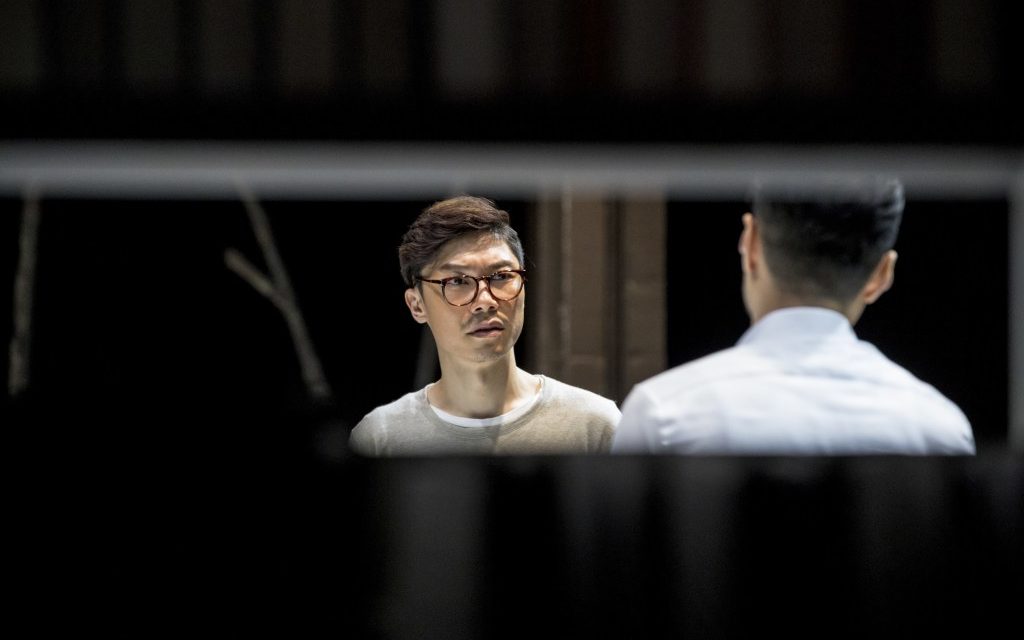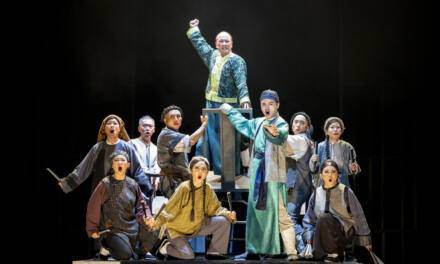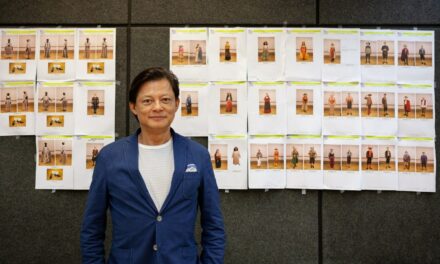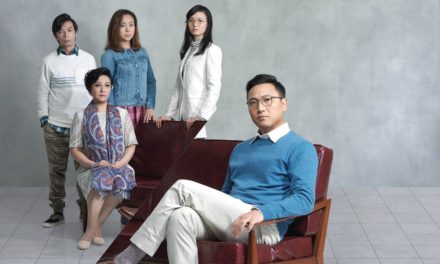It is a blessing to see the recent Hong Kong Repertory Theatre production of Callas Cheang’s new play, An Unjust Good Fellow because it is one of those rare experiences of a local Hong Kong production in recent years when I finally have a cathartic moment, and a long, heavy one.
There is no doubt that the political turmoils in Hong Kong, especially as they got heated up more recently, have given playwrights a lot to write about as a response.
Miss Cheang’s play is obviously one in the canons but unlike most of those pieces that talk about nothing but political ideologies, An Unjust Good Fellow goes back to the root of drama. It serves as an examination on the relationship between the characters and how these characters handle the issues of the day.
The story of An Unjust Good Fellow is about Cheung Yu, a pastor who returns to Hong Kong and is shortly prosecuted by an old woman who claims that Yu has assaulted her, even when Yu was only giving a helping hand. Yu reunites with his childhood friend Ho Cheong, who is now a lawyer, to discuss the case. This leads to an argument between two different ideologies on justice.
If one looks at the premise, one would think that it is another court-room drama that shows the argument between the stone-cold law and the human heart, the dilemma of whether one should prosecute a guilty person who has a humane, pitiful reason to do so. Yet, Miss Cheang brilliantly does not fall into the trap of cliché.
I have to admit that when the play opens with Yu and Cheong arguing about the case, where Yu insists on going to court as he wants justice and Cheong persuading Yu to settle amicably, it felt a bit dull. I thought that this might be another play flooded with ideological soundbites on justice and consciousness. The lines by Yu and Cheong were not subtle at all.

An Unjust Good Fellow. A Hong Kong Repertory Theatre production. Photo Credit: Wing Hei Photography
As the play progresses, I found out that this kind of more-than-obvious writing was deliberate. The play’s structure enlightens me: those blatantly written lines on law and justice were not the main focus. It is the reasons behind the characters who speak those lines that matters. The creme-de-la-creme, the main plot, lies within the relationship between Yu and Cheong.
In the whole one-and-forty-five-minute play, Yu and Cheong appear in all of the scenes, except for one when Yu deliberately helps Chan Hei, the old woman who charges Yu for assault, appears in her apartment where her husband is bound by her because of his illness and tries to bond with Hei, persuading her to drop her charge after knowing what kind of a person she is.
All those scenes between Yu and Cheong, formed a progression of heated arguments on their stances. What is so terrific about Miss Cheang’s writing is not only that the table turns in the middle of the play, when Yu starts feeling pity for Hei while Cheong finally gets the crucial evidence to prove Yu to be not guilty, but also the undertones between the arguments of these two friends.
It is the subtlety about the drive of their arguments that makes me so emotional. Think about why Cheong is still going to find evidence for the case when his original stance is to have a settlement. Think about why during this scene, Cheong is so angry at Yu, trying to explain why Yu is on the wrong side, and why Yu keeps apologising even though he knows he has to do what he thinks is right.
Miss Cheang wants us to look beyond the ideologies and arguments, and feel the friendship between these two individuals, and the love that progresses between these two men through conflict.
It is the love that matters, not the ideologies, and I think director Octavian Chan actually sees that between the lines.

An Unjust Good Fellow. A Hong Kong Repertory Theatre production. Photo Credits: Wing Hei Photography
The production focuses on the emotions between these characters, on the fact that all of them are grounded human beings. Mr Chan gives no more, no less but precise vision on how these characters act instead of giving a stance, but the result is a drama full of love, full of real-time emotions that influence the audience to emote as well.
And the ending is what I feel that Mr Chan is a genius.
Before the show ends, Yu gives his epilogue speech, while the other actors are preparing to set up something on the performing area with the minimalistic but at the same time highly detailed set, designed by Wong Wai Kin.
After Yu finishes, all the actors leave the stage, and the set suddenly becomes an installation for an exhibition on law and poverty. The theatre suddenly becomes a museum, and audiences are invited to walk to the set/installation to read and look at them as art.
When I was looking at the exhibition, I remember that I did not smile at all. The instant feeling I had was that I was like attending a funeral.
What I just witnessed was a theatre show about human relationships and the complicated situations between them. The theatre was alive, thus the set was also alive with the actors.
Now, after the show ends, I get to closely examine the set, which now has a different meaning. It is not a set anymore, but an exhibition, an art installation on real-life in this city.
When I walked around, I just kept thinking and remembering the scenes, the real scenes that were not there anymore, like memories that are already history. The installations become the corpse of the play, and that was when I walked out of the theatre with a heavy heart.
It is an immense ending and I have never experienced anything like that in a theatre show, but I also think that probably this is the way I can finally experience what catharsis means, especially since the play is so close to current reality, and so close to human feelings.
I felt that it is a proper goodbye to the characters in the play, but it is also a celebration of these characters’ kinships to one another, because the ‘exhibition’ enhances that what I just saw is not a story in a bubble.
Performances in the show are the highlight of the night. Man Shui Hing and Ng Ka Leung, who play Hei and her husband Tsui Fuk, give their best craft on stage, breathing air to their characters that the audience will grief for their status.
There are two casts for this show, and I saw the cast with Harvey Sit and Raymond Wan as Yu and Cheong respectively.
I have always thought that Mr Sit and Mr Wan are two among the actors currently working in Hong Kong who are exceptionally good at their craft, as well as charismatic enough to lead their own shows, but are always trapped in productions that do not fully utilise their potentials as leading men.
An Unjust Good Fellow is a product that makes the two actors finally shine as thespians. The dynamics and the chemistry between them are just so riveting that you really believe that they are good friends – best friends even.
This is a story about a duo who knows each other so well, who cares about each other so much, that they brawled their grounded emotions especially in that second to last scene, that after that scene, I can hear the audience sighs during the black out.
It is a mournful reaction directly to the relationship seen, and it is performed with terrific power. I dare say that Mr Sit and Mr Wan delivers one of the landmark duo performance in Hong Kong that I will forever remember.
Production Credits:
An Unjust Good Fellow by Callas Cheang at Hong Kong Repertory Theatre Black Box
Performed in Cantonese
Ended 20th March 2017
This article was originally published on The Typewriter. Reposted with permission. Read the original article and The Typewriter’s art page.
This post was written by the author in their personal capacity.The opinions expressed in this article are the author’s own and do not reflect the view of The Theatre Times, their staff or collaborators.
This post was written by Clement Lee.
The views expressed here belong to the author and do not necessarily reflect our views and opinions.


















